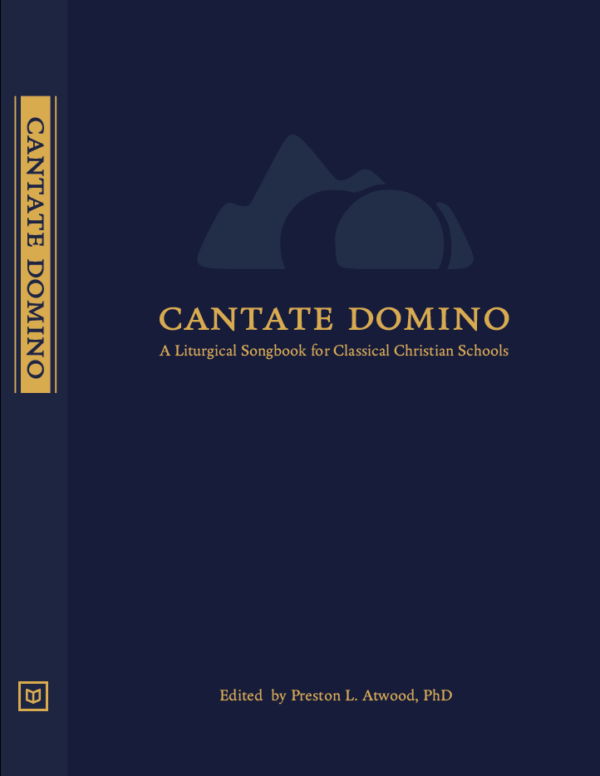Atwood, Preston. Cantate Domino: A Liturgical Songbook for Classical Christian Schools. Hymnworks.
We live in an age of ugliness. Certainly, much remains beautiful and beauty is still all around us, but the world at large has failed to distinguish between the truly, objectively beautiful and that which the masses deem to be beautiful–which is often ugly. Beauty can be in the eye of the beholder only to a certain extent, but in the end, beauty must be objective.
It is not my goal here to defend the objectivity of beauty, only to state it and suggest it can (and must) be defended. But despite the necessity of philosophical essays that defend beauty, one of the most effective ways to defend the objectivity of beauty is to embody it, to incarnate it, to put it before one’s eyes and/or ears for inspection. Actually, the word inspection suggests that we stand before art and judge it; but true beauty judges us. We stand under its authority, and we ought to submit to it with a response of transcendent awe.
In a world confused about beauty, Christians cannot afford to be unsure about it. We must be the caretakers and creators of beauty, the people who champion it in the world of the ugly. We must be artists, musicians, poets, and the like who incarnate the transcendent beauty of God in our own artistic compositions. But we must also be stewards of the tradition, helping the beautiful things of the past find a place for expression in our ugly times.

To that end, Preston Atwood’s Cantate Domino stands as an exemplar of faithful Christian artistic stewardship. Beyond the wonderful collection of hymns, however, Atwood preserves prayers and liturgies with the express aim of serving the classical Christian school and movement.
Last year at my previous institution, we made the excellent decision to institute K-12 cantabile. Unfortunately, many (perhaps most) students did not capture the vision for its importance. Surely some of this was due to an attempt to sing beautiful songs from less than beautiful hymnbooks. In an effort to provide students with a musical songbook, we were forced to print and spiral-bind an online PDF. We regularly found lyrics that had been changed, or famous verses that had been left out, or other such errors. Each time students were instructed to cross out words or verses or add annotations in the margin to help when we returned to the song again. The distraction caused by such annotations (or the numerous words sung because of failure to take or heed such annotations) was immense. What we needed was a songbook that took care to provide us with worthy, singable music in a beautiful medium. Moreover, we needed the prayers, the liturgies, the practices to help shape our time together. We had no such text. But Atwood’s Cantate Domino is precisely this text.
A short survey of the sample pages alone will give potentials readers (liturgists) a picture of what this beautiful edition has to offer. For example, many classical Christian schools pray before each class, but these prayers are often quick requests to help us get through the day. Years ago I switched my pre-class prayers to selections from the Book of Common Prayer, the Valley of Vision, or other prayerbooks. But nowhere in my 50 prayers did I have an excellent pre-class prayer like this one in Cantate Domino:
Prayer Before Study
Christ my Lord, Giver of light and wisdom,
who opened the eyes of the blind man
and transformed the fishermen into wise heralds of the gospel
through the coming of the Holy Spirit,
shine also in my mind with the light of the grace of the Holy Spirit.
Grant me discernment, understanding, and wisdom in learning.
Enable me to complete my assignments and to abound in every good work,
for to you I give honor and glory
through Jesus Christ our Lord. Amen.
The songs included are likewise a well-selected collection and are easily readable for congregational (school) singing. And singing is immensely important.
Music is central to the flourishing of classical Christian education. Indeed, few things are more directly linked to both the heart of classical education and our Christian commitment. As one of the liberal arts, music should be a pillar of a truly classical education, and nothing captures the faith and practice of the historic Church quite like music.
The collection of hymns and liturgies in Cantate Domino demonstrates this commitment to the classical and Christian tradition. The breadth of selections from various traditions, the depth of content selected for inclusion, and the overall design make Cantate Domino the perfect resource for classical Christian schools ready to introduce or deepen their liturgical and musical culture.
~Kyle Rapinchuk, Head of School, Sager Classical Academy

